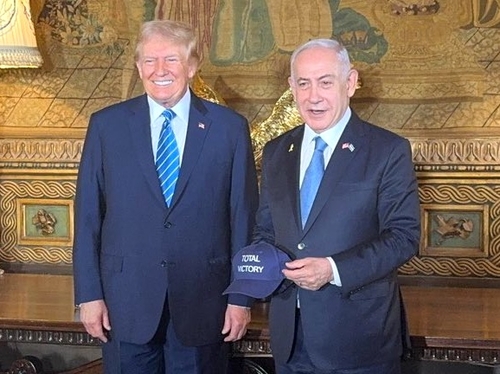Israel followed two opposite policies toward Hamas since Oct. 7: destroy the organization and make a deal with it. This unfortunate two-track approach resulted in many costs to Israel. The killing of Ismail Haniyeh Wednesday perhaps marks the end of this protracted indecision.
The former policy, victory over Hamas, has wide appeal and is articulated often by Prime Minister Benjamin Netanyahu. I count 182 mentions by him of "victory" in 63 discrete statements. "Our victory is your victory," he said June 6 on French television. "Our victory is the victory of Israel against antisemitism. It is the victory of Judeo-Christian civilization against barbarism. It is the victory of France."
Mr. Netanyahu speaks of "complete victory," "total victory," "clear victory," "absolute victory," "decisive victory" and "full victory." He wore a "Total Victory" baseball cap on his flight to the U.S. last week and at his visit with Donald Trump.

But Mr. Netanyahu also pursues the latter, opposite policy: negotiate with Hamas and permit it to survive in exchange for the release of Israeli hostages. In agreeing to haggle with Hamas, Mr. Netanyahu heeds the demands of two powerful lobbies. Western and many Arab governments want a hostage deal, which they see as the best way to prevent a regional conflagration. Fighting already includes Iran, Syria, Lebanon, Jordan, Saudi Arabia, Gaza, the Red Sea and Yemen; governments fear that further expansion would drag in their forces.
A domestic lobby pressures Israel's government to make the return of hostages its paramount goal. Its members march in the streets, occupy parliament, recruit opposition parties, and spin conspiracy theories. This lobby includes military leaders. "The release of all hostages is the supreme mission of the war, before any other mission and at the top of our priorities," Maj. Gen. (res.) Noam Tibon told a rally. Maj. Gen. (res.) Amos Gilad declared: "No victory is possible over Hamas if it later turns out that not everything possible was done to retrieve them. An exchange is a matter of national security."
For nearly 10 months, Mr. Netanyahu equivocated between victory and hostages. He ordered a military assault on Gaza that much reduced Hamas's capabilities even as he sent emissaries to foreign cities to hash out a deal with it. He spoke of "total victory" while trying not to provoke his foreign allies or domestic foes. Indecision also staved off the possibility of the governing coalition collapsing during wartime. Mr. Netanyahu postponed difficult choices.
But if indecision had an inner logic, it had three major costs. First, it condemned the hostages to more suffering. They didn't win release, either through a deal or through an Israeli victory. To quote Tikvah, an organization of hostage families: "The most correct and effective way of retrieving the hostages is by applying uncompromising pressure on Hamas, until the hostages become a liability for Hamas instead of an asset."
Second, indecision exacerbated dissension within the Jewish state, where an unending argument among Israelis grew heated and even violent.
Third, it damaged the security of Israelis. The country that once made "no negotiating with terrorists" its mantra and pulled off the 1976 Entebbe raid now called the return of hostages "the supreme mission." This makes abduction a powerful tool of warfare and implicitly invites further kidnapping.
The drama and chutzpah of killing Haniyeh on a ceremonial visit to Iran appears to end the indecision. Mr. Netanyahu has thrown down the gauntlet, indicating that Israel intends to crush Hamas and win rather than negotiate with it and permit it to survive.
As ever, victory requires greater bravery and sacrifices, making it the more difficult choice. As ever, it alone offers success.
Mr. Pipes is president of the Middle East Forum and author of Israel Victory: How Zionists Win Acceptance and Palestinians Get Liberated.
July 31, 2024 additions: (1) Interestingly, Dan Perry offers an opposite interpretation to mine of the Haniyeh and another Israeli assassination (of a Hezbollah figure in Beirut): "Netanyahu could leverage these assassinations as a way to bow to this pressure without appearing weak, hypothetically accelerating the negotiations to end military hostilities and bring home the remaining hostages."
(2) On cue, Eyal Kalderon, a cousin of Hamas captive Ofer Kalderon, states that "The hostages must be the first priority. Then we will make sure to bring justice and take care of all the terrorists in the world, but the hostages need to be the first priority."
Fortunately, Tzvika Mor, co-founder of the Tikvah Forum for Families of Hostages and father of Hamas captive Eitan Mor, says otherwise: "Israel's enemies should know that we are strong, and we are not afraid of them. Doing things like this will make them realize that we are ready to fight this war. I think this is a very positive development."
Aug. 2, 2024 update: I lauded Israel's "bravery and sacrifices" in the Wall Street Journal, above; in response to the same policies, Steven Erlanger in the New York Times characterized Israel as appearing "to have gone rogue."
Aug. 3, 2024 update: Confirming my argument above, Israel's Channel 12 reports that Netanyahu banged on the table and told off his national security team, including Defense Minister Yoav Gallant, IDF Chief of Staff Herzi Halevi, and Shin Bet head Ronen Bar: "You are weak. You don't know how to run a tough negotiation. You are putting words in my mouth. Instead of pressuring the prime minister, put pressure on Sinwar." Then, as explained by the Times of Israel,
The security chiefs reportedly left the meeting concluding that Netanyahu does not want a deal at this point. [Channel 12] quoted unnamed security sources saying he remains stubborn "even though we have made clear to him that the security establishment can deal with the consequences of a deal." The unnamed sources were also quoted asserting, "He has given up on the hostages."